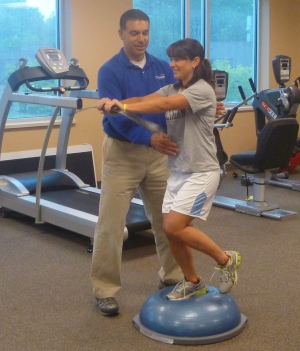Home » Men's Health »
Tips for Vestibular Rehabilitation
People who suffer from regular bouts of dizziness can tell you that it is often more than a simple case of sea or air sickness. It’s more than a momentary bout of feeling unbalanced, whether it comes from inner ear disorders, head injuries, labrynthitis, stroke or neurologic problems. Severe or prolonged dizziness and imbalance can interfere with a person’s job and lifestyle, making it impossible to drive or operate machinery. It can even make it impossible for a person to perform routine activities such as taking a walk around your neighborhood.
Fortunately, vestibular rehabilitation can help most sufferers to return to a normal lifestyle, with independence in almost all aspects. Such rehabilitation focuses on sensorimotor retraining activities that include physical and visual exercises as well as education for the patient. The patient’s family members may also be called upon to take part in these rehabilitation activities. Most patients quickly discover that they can return to work and social activities with ease.
That said, a positive attitude is one of the best tools a patient can bring to his or her vestibular rehabilitation process. Solid belief that retraining oneself is possible can make the difference between success and failure. So trust in your own ability to respond to the proven exercises that will be taught to you. Then devote yourself to the most important aspect of the process-getting well.
Trust in the staff at the rehabilitation facility to teach you the proper way to perform these exercises. After all, they are experts, with many successes under their belts, and you are their priority while you are with them. You’ll quickly find that your therapist is the authority on you. After a thorough evaluation of your condition, your therapist will know your posture, balance and gait better than you do-and he or she will know how to improve those traits. In fact, your therapist will develop a treatment plan that is customized just for you, and it will include specific body, head and eye exercises to help you to get better.
One thing you will quickly learn is not to rely on uncomfortable patterns of head and body movement to maintain coordination and balance. You may have found yourself walking with an exaggerated sway of your hips in order to balance your body. Or you might find yourself staring at the floor whenever activity around you becomes too visually intense. Such changes in your manner of moving and paying attention can, however, make your condition worse. They can cause you to experience headaches and muscle tension in addition to your dizziness. So instead of relying on these uncomfortable patterns, take advantage of the lessons in coordination that you will learn during vestibular rehabilitation.
And don’t become discouraged if your treatment plan makes you feel worse for a short while. After all, you will be learning new ways of moving and visualizing the world around you. If you practice your exercises faithfully-and correctly-you will discover that your dizziness, headaches and muscle tension will diminish. In fact, vestibular rehabilitation therapy is often so successful, that the patient will no longer experience vertigo, dizziness or a sense of imbalance. Because that is your goal as well as your therapist’s, you can take heart that any uncomfortable symptoms will soon go away.
Be alert to things that can cause your symptoms to recur. Such things include a bad cold, a fall, or anything that disrupts your normal activity. When such things occur, your brain can forget how you are supposed to function through a process called ‘decompensation‘. But if you are aware of triggers to your symptoms, you can easily begin practicing your exercises at home and take back your control.
You can also take up an active sport that is suitable for balance training. Such sports include ping-pong, volleyball, or tennis. You might even benefit from yoga or tai chi. The benefits of such activities is that they include head movement and eye-hand coordination. They are also fun, which will help with your attitude toward your condition. Of course, you will want to monitor yourself for symptoms as you take part in such activities. It is also wise to consult with your physician before taking on such sports to make sure that you are physically capable and fit enough for such activities.
However, if your home exercises and sports activities do not quickly bring about results, you will want to contact your doctor. It is possible that additional vestibular damage has occurred, which may require you to return to a rehabilitation center or to take on other types of medical treatment.
These are just a few tips for vestibular rehabilitation. Discuss them with your doctor and your therapist, then put them to use along with others that will be prescribed specifically for you. You are sure to see positive results much faster than you ever dreamed, and you will be able to return to your normal lifestyle with relief.






0 Comments
You can be the first one to leave a comment.